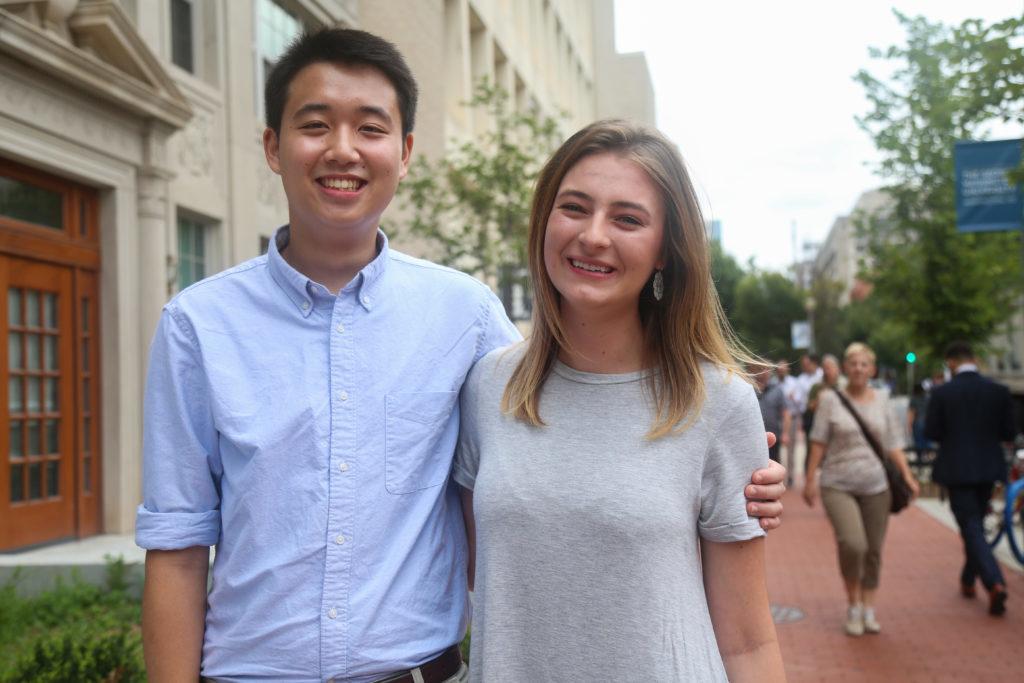GW’s top officials are hoping to address student concerns about campus life and the University’s widely criticized bureaucracy this academic year.
The Board of Trustees is launching a task force this fall focusing on the student experience, examining everything from residence hall life and affordability to the process of switching majors, Board Chairman Nelson Carbonell said. The move follows University President Thomas LeBlanc’s interest in student satisfaction and daily life on campus after years of advocacy by student leaders on affordability and student space issues.
The task force, which will begin meeting in October, will research student issues on campus and eventually produce recommendations to address them, Carbonell said.
Carbonell said the idea for the task force was sparked after students showed up in waves to town halls during the University’s search for a new president last academic year. He said the overall message he heard from students was that their lives on campus could be improved.
“You’re a student, and there might be someone who is in charge of your academic experience, and that’s part of the experience – it’s an important part, it’s not your whole experience,” he said in an interview last month. “You live in dormitories, you have community be part of it, things like that, and so I think that what I heard from students and what we heard from students collectively was that our student experience could be better.”
At the meetings, students said officials needed to do more to support international students, improve relations with student activists and address affordability concerns.
Carbonell said the group will meet for at least a year, but that typically task forces last no longer than two years. The task force will consist of about 12 to 15 members, including seven trustees listed on the Board’s website and two students.
Student Association President Peak Sen Chua and Executive Vice President Sydney Nelson will serve as the two student voting members on the task force. The pair said their participation will overlap with some of their goals in the SA and that they can provide the Board with unique student perspectives to tackle problems.
“The student experience is so broad, and I think Sydney and I can bring the student voice to many different parts of the student experience that the Board of Trustees might not be privy to,” Chua said.
Nelson said members would look at “creative solutions to really traditional problems” impacting students, including SA priorities like affordability concerns with dining and textbooks, and how administrators support students.
Affordability has dominated the SA’s agenda for years and was a prominent platform in last year’s elections. Nelson and Chua said they plan to pursue a free 18th credit for students and reduce the cost of student spaces. Over the summer, the SA launched its “Top Textbooks” program, in which students can rent popular textbooks from GW Libraries instead of purchasing them.
“We’re there to represent the student voice and perspective,” she said. “Especially with the student task force being called the student experience task force, I feel like you can’t really have a discussion about student experiences without having students.”
Both the SA and LeBlanc will host town halls throughout the year for students to raise concerns and air grievances. LeBlanc’s community meetings will start this week in Foggy Bottom and continue next month on the Mount Vernon Campus. The SA’s first gathering will be held this fall, but a date hasn’t yet been set, Nelson said.
“We’re going to be consistently dedicated to hosting events and opportunities for students to share their voice in a consistent manner, which will then eventually trickle its way to what we share with the Board of Trustees and the student experience task force,” she said.
Chua and Nelson will serve on the task force after a push from student leaders to expand student representation on the Board, following the decision not to install a student as a full voting member.
Chua said Carbonell asked the two to represent the student body in the task force during a June introductory meeting. They were also responsible for appointing two student members to a second task force focused on alumni engagement.
The task force will meet four times over the course of the year, when trustees gather in the District for meetings. The trustees will likely “steer” the task force in a certain direction, where they can then analyze and highlight student issues, Nelson said.
The Virginia Tech administration commissioned a similar task force which produced a 2015 report recommending improvements to student spaces on campus, regular renovations to residence halls, more financial support for students to narrow socioeconomic gaps in the student body and better student-faculty relations.
The same year, a task force at Tulane University – one of GW’s peer institutions – issued a report about the undergraduate experience, which recommended investments to update technological and educational programs, construct more student spaces and residence halls and create scholarships to increase diversity.
Michael Mirro, the chair of the Board of Trustees at Indiana University, said IU’s board has a student affairs committee and also holds their meetings publicly, allotting time for students to comment.
Mirro said the Board’s most recently departed student trustee was able to contribute unique perspectives and opinions to discussions, bringing to light issues that students were concerned about but that trustees otherwise would not have been aware of.
“She funneled concerns of student representatives who maybe didn’t want to bring things up in public, and she would let us know,” he said.
Leah Potter contributed reporting.





